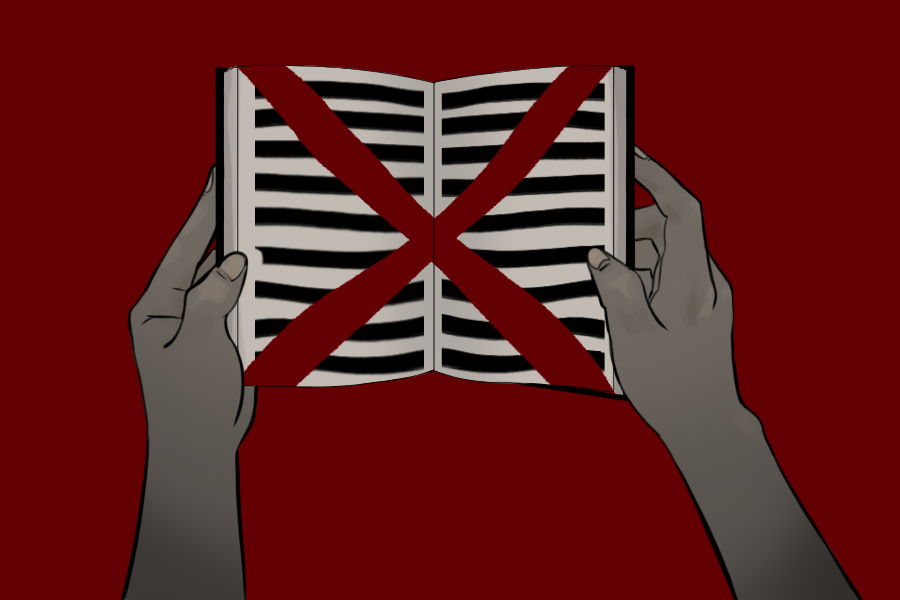In the November 7th Iowa elections, the citizens of Iowa City demonstrated their disapproval of the new book-banning regime by defeating three conservative board members who support book banning in a landslide victory for intellectual freedom.
Despite this win, the Iowa City Community School District is still subject to Senate File 496, a law that was passed by the Iowa Legislature in May, 2023. This new law requires all public school districts in Iowa to remove books that “depict or describe sex acts.” Last month, the Iowa City Community School District published a list of books they are now required to remove from their libraries in order to clarify the effects of the new law to administrators, librarians, and teachers.
Senate File 496 constitutes the first-ever statewide book banning law in Iowa. Critics may argue that these books are not “banned,” but merely limited in access. However, according to Britannica, book banning is “the practice of prohibiting or restricting the reading of certain books by the general public or by members of a local community or religious group.” Access to these books has been restricted; therefore, according to this definition, they are banned.
On November 28th, the American Civil Liberties Union (ACLU) filed a lawsuit against the Iowa Legislature and demanded that Senate File 496 be suspended immediately, because in addition to requiring the removal of books containing “sex acts,” Senate File 496 contains anti-LGBTQ+ legislation and requires staff to report students who use different pronouns or nicknames in accordance with their gender identity. The ACLU represented eight students and their families from the State of Iowa. The lawsuit is currently going through the legal system as of the publication of this article. One student involved in the case is City High student Puck Carlson ‘24, who identifies as nonbinary.
Puck Carlson said in a statement that removing books is detrimental to queer students.
“Removing books that discuss queer topics or people from our schools tells our queer students that they do not belong there, that their existence is shameful,” Carlson said in a statement. “I am not shameful.”
On November 30th, the publishing company Penguin Random House and several best-selling authors filed an additional lawsuit against the State of Iowa for its book-banning provision on the grounds that it violates the 1st and 14th Amendments.
Many students assumed that Senate File 496 did as much to police student reading as the Iowa Legislature could hope to do. But things have only gotten worse from there. On November 14, District leaders emailed all secondary English teachers to inform them that students could no longer read any independent reading books for an English class that do not already belong to the school library. According to teacher estimates, about a third to half of all students typically bring books from the public library or from home.
The impact of this new rule is to drastically cut the number of books that high school students are allowed to read for school. The City High School Library has many fewer books and is much more limited in scope than the Iowa City Public Library. While the ICCSD’s list of 68 banned titles is clear-cut and obvious, this new rule is much more insidious and much more harmful, amounting to the de facto removal of thousands of books from what can be read for independent reading in English classes. While the City High Library is carefully curated to cater to teenagers’ interests, it is relatively limited, and does not have access to a budget that would allow it to include everything a high school student might want or need to read. Furthermore, this new rule goes against the intention of Senate File 496 by infringing on the rights of parents to provide independent reading books to their children and to have a say in what they read at school. This restriction affects families from across the political spectrum. Neither liberal parents nor conservative parents will be able to choose which books their students read. The Color Purple, a book that reflects typically liberal ideologies, is on the banned list, while Hinds Feet on High Places, which reflects typically conservative ideologies, is not in the City High Library.
As a result of the Senate File 496 and the District’s new rule, a small number of adults are being allowed to diminish and control entire families and communities, as well as the reading materials of 156,336 public high school students in Iowa. These book bans are detrimental to the education of City High students, reducing their allowed reading materials to a fraction of what they were previously able to have access to. It also undermines the rights of parents by not allowing them to have input into the reading of their teenagers.
Perhaps most significantly, the law also takes away the agency of high school students, treating teenagers as if they were small children, and restricting their access to great works of literature that the libraries cannot afford. Students are also no longer able to participate alongside teachers, librarians, parents, and citizens on book review committees, erasing our opinions and perspectives even when we are the ones this law is impacting.
We high school students should not have our education undermined for political reasons by the adultist Iowa Legislation. We should be treated as individuals capable of making decisions for ourselves.
We support the ACLU’s demand that Senate File 496 be suspended immediately. The book-banning laws are unfairly destructive to education at City High School and infringe on students’ rights to choose what they read.
We support Puck Carlson’s reflection on the importance of reading in their life and in the lives of others.
“Reading has always been a fundamental part of how I learned to understand the world around me,” Carlson stated. “Every student should have the right to do the same: to be able to learn about people, cultures and perspectives, and to be able to learn about all of the world around them — not just parts of it.”






























